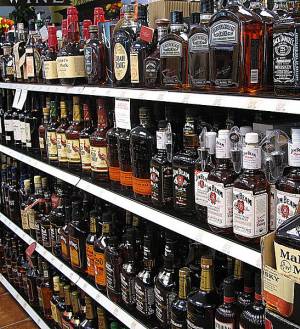
Various American whiskeys (including Bourbon) on a store shelf (Photo credit: Wikipedia)
When you walk down the aisles of your local liquor store, you get bombarded with all kinds of different choices. From brands, to flavours, to types of alcohol – the choices can be confusing and endless.
One of the most convoluted classifications has to do with whiskey. Whiskey can have so many permutations ranging from geographic area (Canadian, Irish, Scottish, American, etc.) to the many different types of whiskey (single malt, blended etc.). Bourbon, scotch, and rye all fall under the umbrella of whiskey, the most popular of which is bourbon.
But, if bourbon is technically whiskey, why is it named differently? What is the difference between whiskey and bourbon?
Whiskey
First of all, the spelling of whiskey changes with the geographic area you are referring to. American and Irish whiskey drinkers keep the “e” while Canadians and Scots leave it out. The actual contents of the bottle do not change drastically based on spelling though, so there’s no reason to be confused on that front.
Whiskey, by the Merriam-Webster dictionary definition is “a liquor distilled from fermented wort (as that obtained from rye, corn, or barley mash).” Wort can mean two things. Firstly, a plant, especially a “herbaceous” one (“herbaceous” meaning a plant that has either no or very little woody tissue) or secondly, a sweet liquid drained from mashed plants used in producing liquor.
Thus whiskey is an alcohol that is made from the fermented remains of leafy plants like malt, rye, corn or barley.
Bourbon
There are a couple of things that make bourbon what is it. The most commonly cited fact about bourbon is that it is whiskey that is only produced in the United States of America. That is correct, given that most bourbon has to legally be produced in the US. But that’s not the only difference.
There are several definitions for bourbon on Merriam-Webster, and only one has to do with alcohol, so we’ll stick with that one. Merriam and Webster say that bourbon is “a whiskey distilled from a mash made up of not less than 51 percent corn plus malt and rye.”
Essentially, not all whiskey is bourbon, but all bourbon is whiskey. Specifically, bourbon has to have more than half of its fermented wort to be made up of corn, with some other plants added in, with the added caveat that this process needs to take place in the US.
Others

Barley malt is used to make the majority of malted whiskeys (Photo credit: Wikipedia)
When looking into the differences, another alternative arises in “rye whiskey”. The main difference here is probably apparent to most at this point. However, if you’re not following along, the main component of the fermented wort in rye whiskey is rye grain, as opposed to corn or malt. Malt whiskey follows the same pattern, being made primarily from malt grain.
Each of these different types of whiskey have their own unique flavour aspects. Also, the geographic area of whiskey production changes the flavour, along with the company who makes it. This distinction is really up to personal taste.
However, hopefully now you will find yourself better equipped to make an informed choice during your trip to the liquor store.
Works Cited
- bourbon. 2013. In Merriam-Webster.com. Retrieved February 17,, 2013, from http://www.merriam-webster.com/dictionary/bourbon
- herbaceous. 2013. In Merriam-Webster.com. Retrieved February 17, 2013, from http://www.merriam-webster.com/dictionary/herbaceous
- rye whiskey. 2013. In Merriam-Webster.com. Retrieved February 17, 2013, from http://www.merriam-webster.com/dictionary/rye%20whiskey
- whiskey. 2013. In Merriam-Webster.com. Retrieved February 17, 2013, from http://www.merriam-webster.com/dictionary/whiskey
- wort. 2013. In Merriam-Webster.com. Retrieved February 17, 2013, from http://www.merriam-webster.com/dictionary/wort